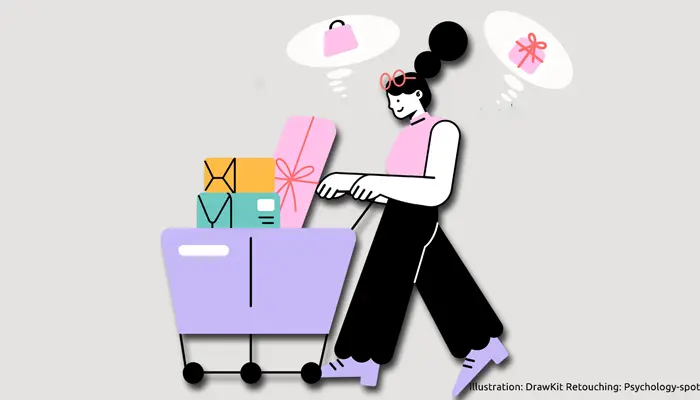
We all know materialism is not a good counselor, especially if we’re seeking happiness. In fact, different studies confirmed the negative effects of being materialistic on our well-being. And now a study conducted at Michigan State University revealed that materialism also affects our perception of negative events.
These psychologists found that materialism is not only the antithesis of individual well-being, but also has a side effect that we should avoid: it amplifies traumatic events, whether an illness or a car accident. In other words, it makes life appear worse than it really is.
Materialism paints of gray our lives
Researchers looked at soldiers suffering from posttraumatic stress disorder and found that those with a materialistic vision of the world not only showed more severe symptoms, but reacted even worse to alleged terrorist threats, also showing a higher level of anxiety.
In practice, if you are materialistic and suddenly your life takes an unexpected turn, you will need more time to retrieve from the setback. Everything seems to indicate that problems have a stronger impact on people with materialistic values, because these exert some kind of a multiplier effect of negative aspects of the situation.
Why materialism is not a good counselor to deal with problems?
1. Promotes ineffective strategies to deal with problems. At the root of materialism hides a low self-esteem. People who don’t have a high regard of themselves are afraid to look inside, they prefer to focus on material things. Obviously, many of these people don’t have the psychological tools they need to deal with stress, so they end up using the materialistic strategies that do not solve the problem.
The typical example is that of a person who has had a discussion with the partner and, to relieve stress, decided to go for shopping, or take refuge in the kitchen. Both choices help to get distracted for a moment but don’t solve the problem, only hide it. As a result, when the problem occurs, it is usually larger because accompanied by new difficulties.
2. Creates a feeling of permanent insecurity. If we believe that success and happiness depend solely on external factors we will always be at the mercy of situations, and this creates great uncertainty. Therefore, materialism is associated with a strong sense of insecurity. In fact, a study conducted at Ohio State University found that the more insecure persons are also those that have a higher tendency to materialism.
Of course, if you think the solution of the problems doesn’t depend on you and you don’t trust your skills, for you it will be hard to be optimistic. Therefore, materialistic people feel more easily overwhelmed by problems. It is simply a matter of perspective.
3. Generates depression and intensifies the feeling of loneliness. Focusing on material possessions and social status can lead to depression and intensifies the feeling of loneliness. A study at Northwestern University found that, regardless of the characteristics of the personality, living a materialistic life ends up creating problems and affects negatively our interpersonal relationships, increasing the level of depression.
No doubt depression doesn’t help us to develop a more positive outlook on life and not even motivates us to discover life lessons hidden behind negative events. On the contrary, those who cultivate their interpersonal relationships and care their personal growth, prefer experiences over material goods, by doing that are more satisfied with their lives.
In any case, always remember that “it’s not rich who have more, but who needs less”.
Sources:
Ruvio, A. et. Al. (2014) Eli Somer, Aric Rindfleisch. When bad gets worse: the amplifying effect of materialism on traumatic stress and maladaptive consumption. Journal of the Academy of Marketing Science; 42(1): 90-91.
Bauer, M. A. et. Al. (2012) Cuing Consumerism: Situational Materialism Undermines Personal and Social Well-Being. Psychological Science; 23(5): 517–523.
Arkin, R. M. et. Al. (2002) Materialism as an attempt to cope with uncertainty. Psychology and Marketing; 19(5): 389-406.



